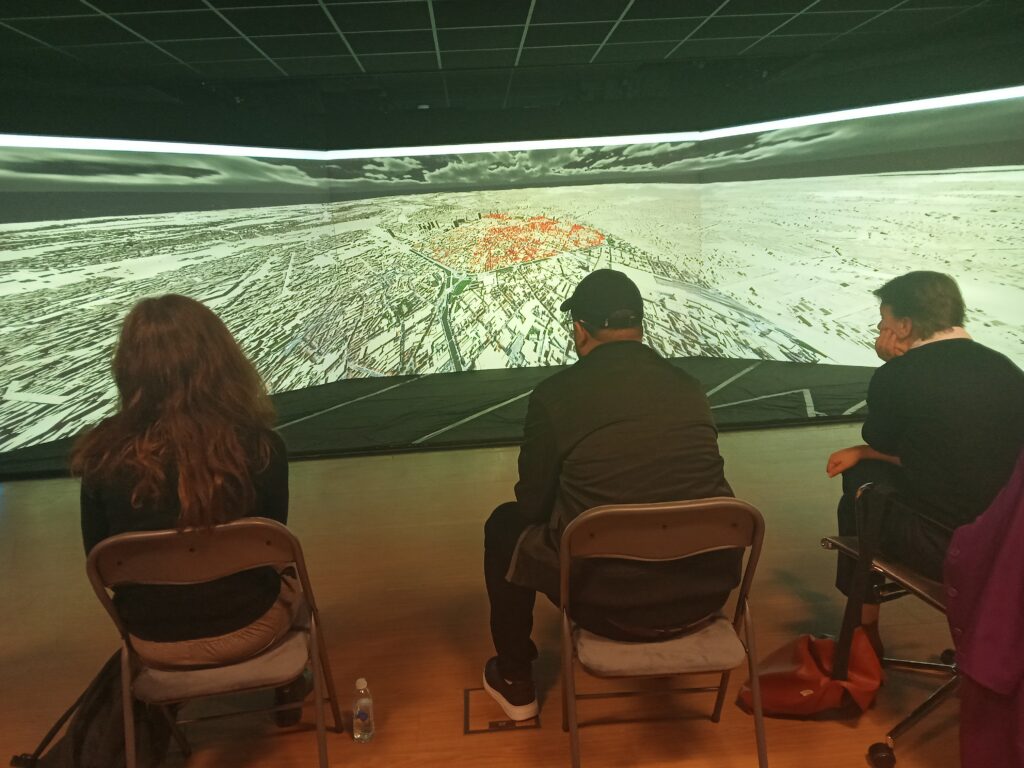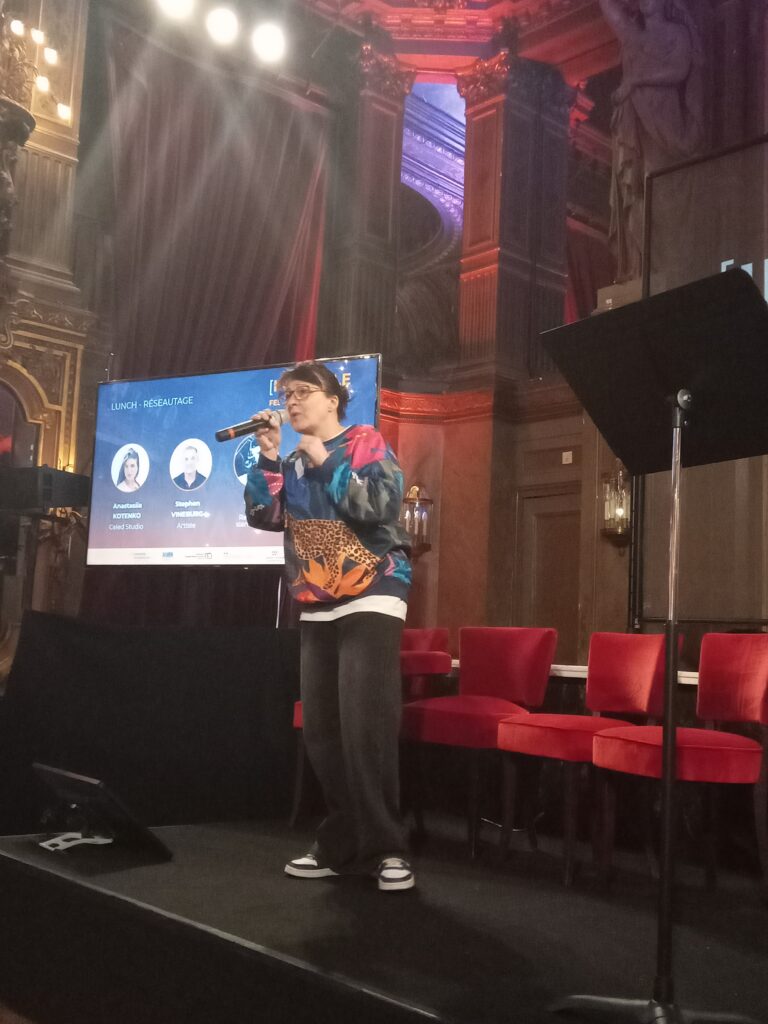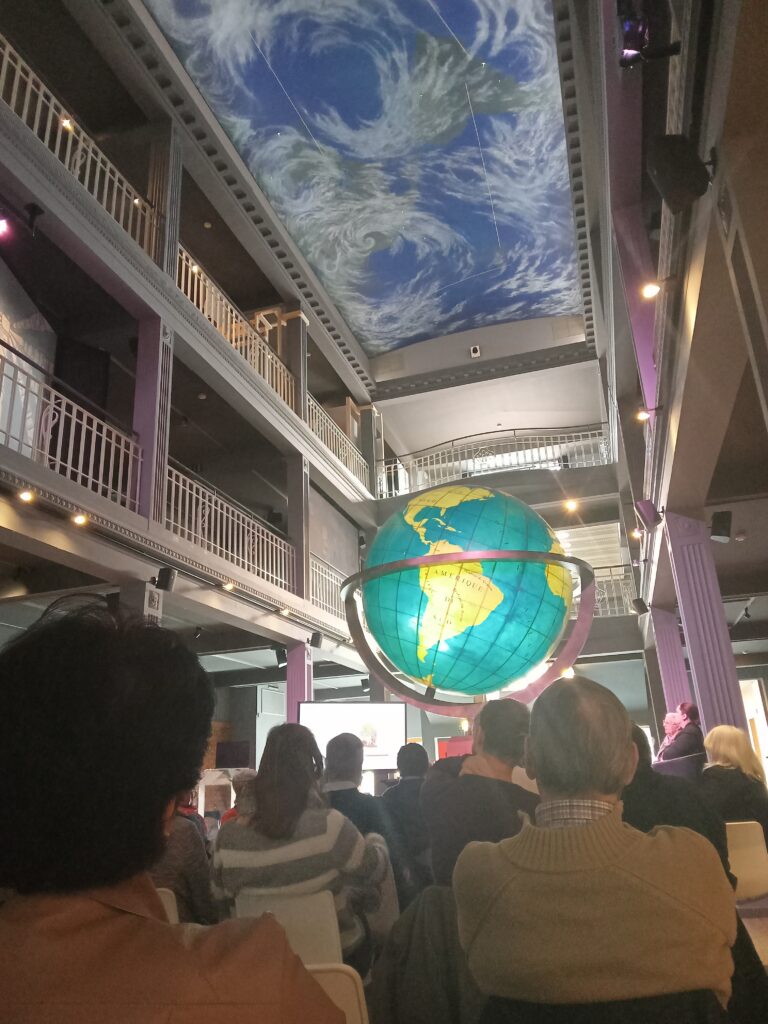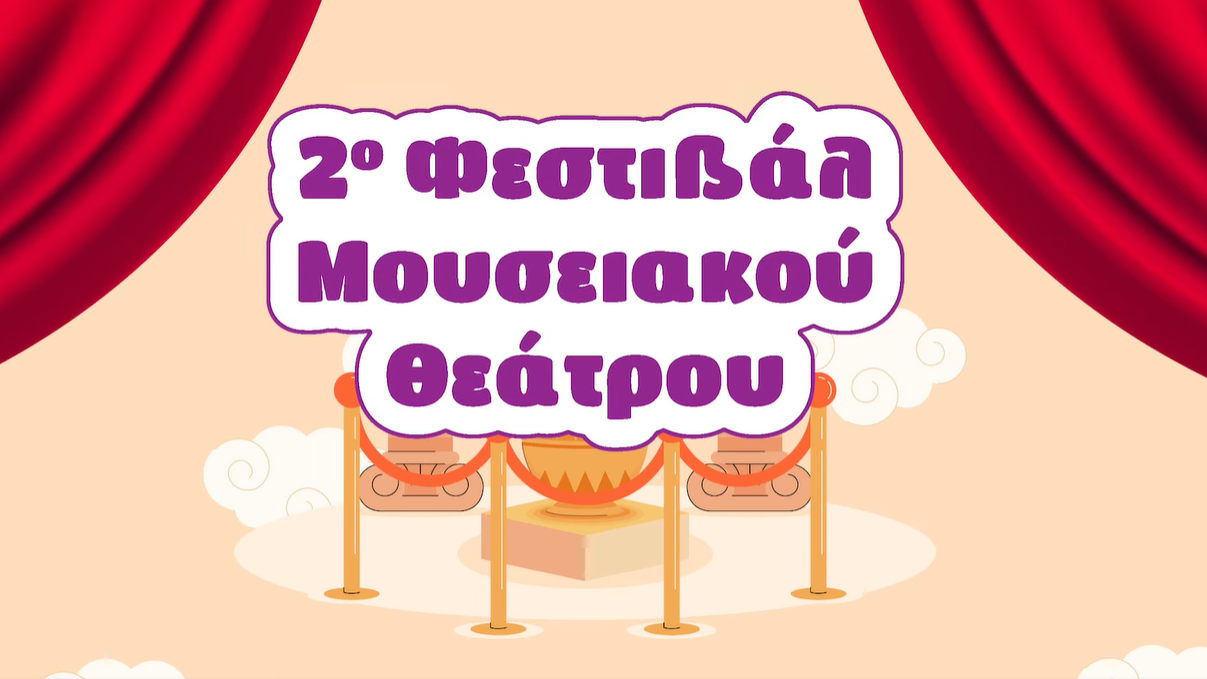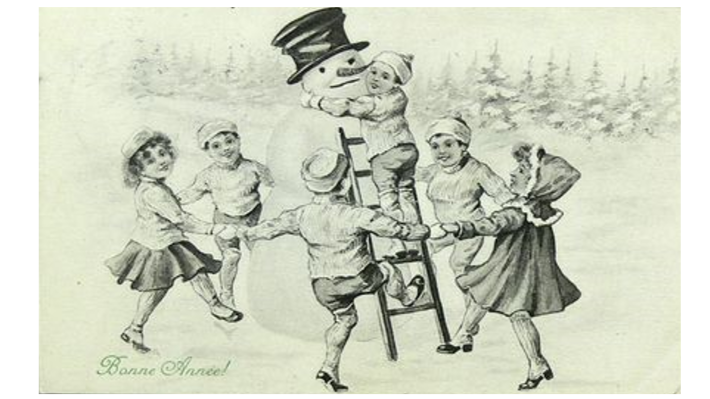Last week, we had the honour of participating in the INVISIBLE FESTIVAL, together with content creators, cultural managers and academics from Belgium, France, the Netherlands, Tunisia, Morocco, Senegal, Ivory Coast and Canada. A celebration of international collaboration in the field of XR, GEN AI, public history and cultural heritage!
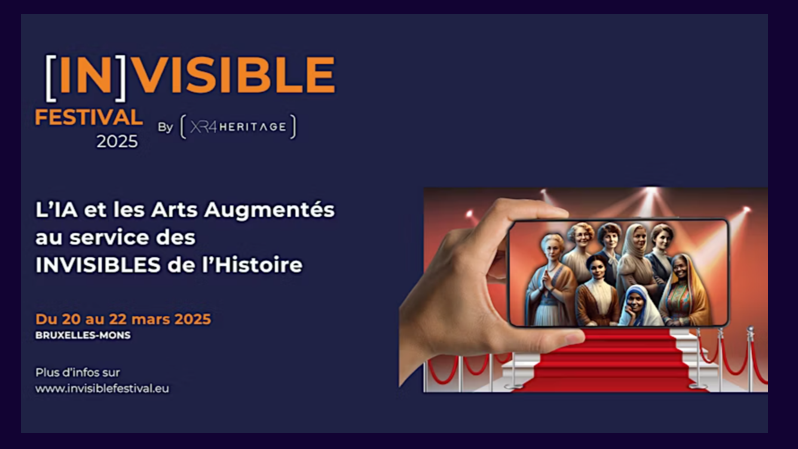
An initiative of XR4Heritage, the INVISIBLE Festival is the first augmented art festival in the heart of Europe to shine a spotlight on untold, unknown, “invisible” histories of people. An official partner of European Artificial Intelligence Week (by AI4Belgium) the Festival returned for this second edition, on March 20 to 22 in Brussels and Mons.
The free event invited participants to explore the world of generative AI photo/video/chatbot content – including AI influencers and Deepfakes – at the point where archives and public history meets XR content creation. Taking on the topic of gender equality, the 2025 program of presentations, performances, workshops, and round tables showcased XR-AI projects that highlight women’s contributions to STEAM* professions throughout history.
*Science, Technology, Engineering, Arts, and Mathematics
Heterotopia was invited to deliver a keynote about how the methodology of museum theatre can provide a theoretical and practical basis for the digital presentation of first-person narrative history – especially those untold, unknown, “invisible” histories.
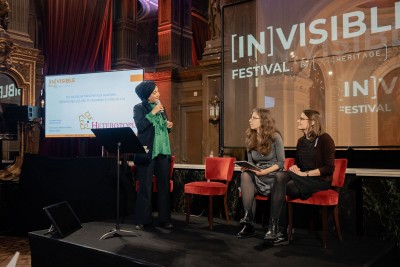
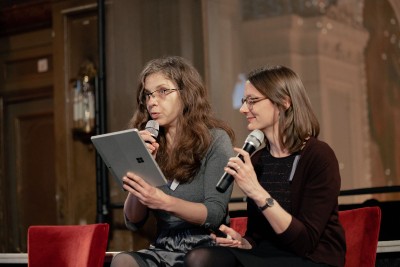
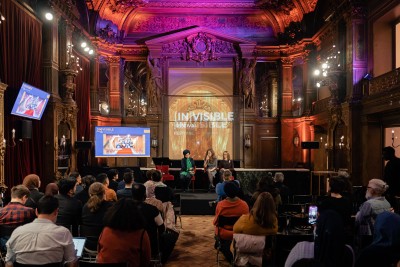
Above all though, the INVISIBLE Festival was an opportunity for us to learn about the AI industry and discuss the ethical and technical issues surrounding the adoption of new technologies in the culture, tourism, education and media sectors. It was a chance to explore the ways in which museum theatre – with over 100 years of history as a museological practice – is feeding into / transitioning into the AI-powered (near) future of heritage interpretation.
At the heart of the INVISIBLE Festival concept is the ‘Concours des AVATARS’ which, each year, offers around 20 international talents a unique programme of support based on generative AI applications applied to the creation of image, video and sound content. The aim is to explore how these technological solutions can be used to shed light on little-known or forgotten figures from history. This year’s competition cohort brought together the design talents of Gaming Corp (same same brussels) and Tekno-Family from Brussels; Cassablanca’s Ecole Marocaine des Sciences de l’ingénieur and LionsGeek; the Groupe Institut Africain de Management 2 (Dakar); AFRIKA TOON (Abidjan); and NETINFO Ecole d’Art et de Technologie (Tunis).
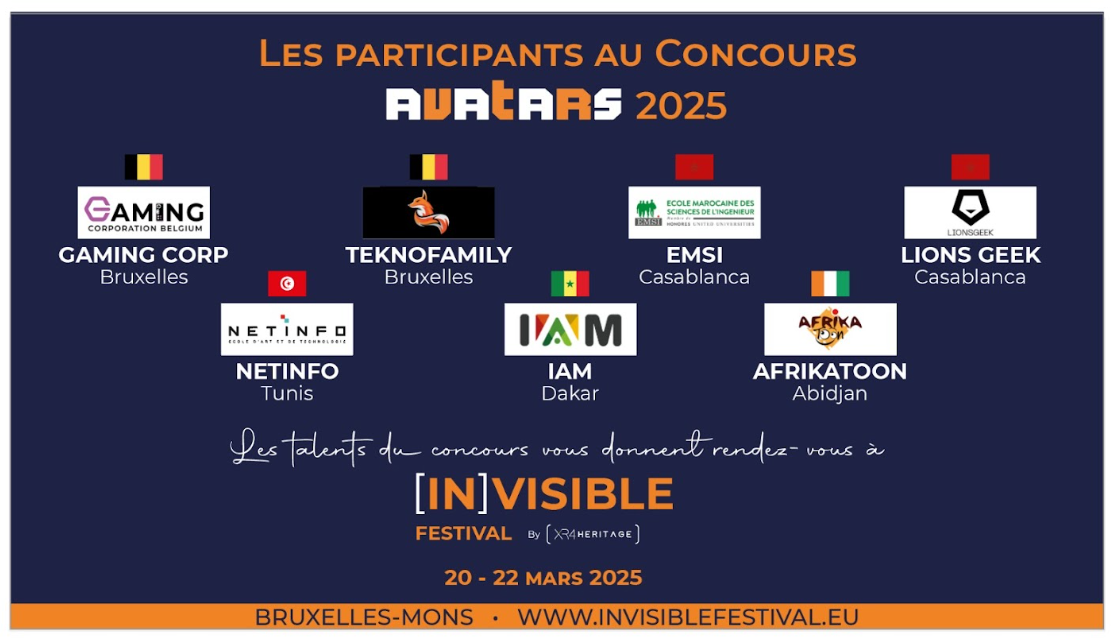
Their challenge was to use AI tools to reimagine and “reincarnate” remarkable women from history as Instagram avatar-influencers: engaging new audiences with the issues of gender equality and social justice. The design teams made use of an array of AI tools to design and refine the content they were creating. Giving careful consideration to the key themes and topics of their chosen person’s story, the context of their lives and the environment they lived in. They sourced information and material that would help them ‘set the stage’ for their avatar, dress them and voice them appropriately.
During a project showcase for the Festival participants, we were introduced to:
- emblematic Egyptian feminist leader, Huda Sha’arawi;
- celebrated Senegalese author and feminist Mariama Bâ;
- American civil rights activist and abolitionist, Sejourner Truth;
- and Tunisian pioneer of education and autonomy for women, Manoubia Ouertani.
Going even further back:
- 18th century French playwright and human rights activist, Olympe de Gouges;
- 17th century Tunisian princess and founder of healthcare institutions, Aziza Othmana;
- influential 11th century queen and founder of Marrakesh, Zaynab Nefzaouia;
- and 7th century Berber religious and military leader, Dihya Al Kahina
…were all reimagined in digital.
A panel of experts from the culture and heritage sector gave feedback to the teams and an open discussion followed. It was interesting to note the contrast between the norms of 1st-person interpretation (a two-way encounter with an individual at a specific moment in their life, within a specific historical context) and the requirements of the social media comms and influencer space, where a personality might represent a cause, a culture, a set of ideals or principles more generally. The competition design teams tended to choose a youthful, ethereal and heroic aesthetic for their historical avatars. This was not without reason given the platform, the intended audience and the requirements of the competition challenge, but it naturally raised concerns about the representation of women.
How then should we best present a person in the form of a heritage avatar if this avatar needs to somehow represent/embody a person’s entire life and achievements? How do we frame the encounter and support interaction without a time and place to provide context? How do we ensure that the avatar looks “authentic” or “correct”?
These questions were explored further during the subsequent presentation of MAMA AFRICA: an initiative of XR4Heritage in collaboration with the Miriam Makeba Foundation (South Africa). This work-in-progress brings together talents from theater, film, gaming, heritage, and new technologies. Together, they are exploring new forms of writing, multisensory cinema and immersive performance practice to go beyond a simple biopic. MAMA AFRICA brings to life, through multiple modes and means, the legacy of Miriam Makeba (1933-2008); celebrated singer and anti-apartheid icon.
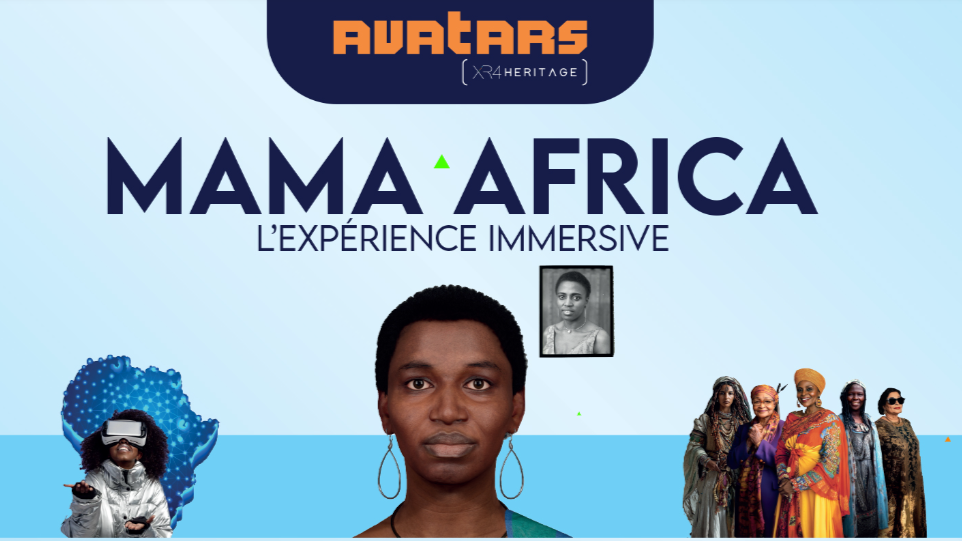
One aspect of the work was the creation of a generative AI-powered chatbot avatar which, rather than claiming to be Miriam herself revived in digital, is introduced as her ‘memorial avatar’. Drawing on a selected library of source material (thanks to Retrieval-Augmented Generation) and foregrounding particular topics of importance, such as freedom and human rights, the avatar is able to respond spontaneously to questions from the audience in a way that aligns with Miriam Makeba’s stated beliefs and the known facts about her life story.
Part of the process of creating this avatar involved AI animation tools that drew on photo and video archives of Miriam Makeba to arrive, after a series of prompts and refinements, at a visual identity that captures (as close as possible) the celebrated singer’s features and style over a period of her youth – she could be 20, she could be 40. Gestures, expressions and dance moves were added to the avatar’s physical repertoire thanks to AI animation and motion tracking & capture technologies; drawing again on archival sources as well as the input of live performers. During the INVISIBLE Festival presentation of Miriam Makeba’s memorial avatar, her own words were also brought to life, live on stage, via a series of readings from her biography by the talented actress, Claudine Gourdin. This parallel performance, with its emotional depth, nuance and vitality, was enriched with a display of multimedia archival content.
AVATARS200 – 200 historical AI avatars in celebration of Belgium’s 200th anniversary
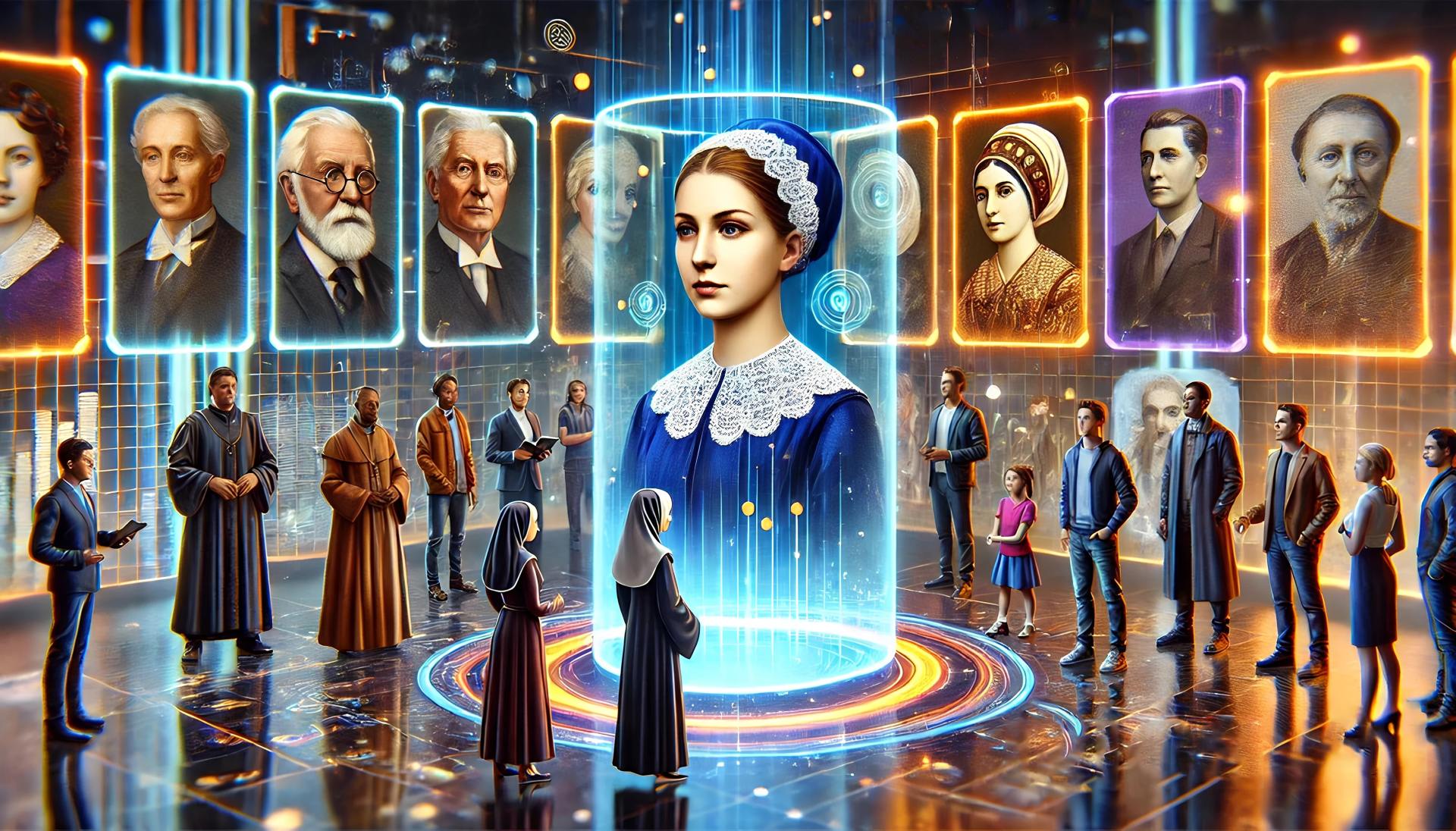
The 2025 edition of the INVISIBLE Festival also saw the launch of AVATARS200; an ambitious public campaign to honor the bicentenary of the foundation of the Belgian state (coming up in 2030) through the creation of 200 AI avatars of historic personalities that shaped Belgium. The challenging task of selecting these personalities will be the subject of a series of open public consultations across the country. The aim is to bring a range of perspectives into the debate and ensure fair representation of contemporary Belgian society. A bold initiative! We are watching with interest and admiration!
Other INVISIBLE Festival highlights included an introduction to a myriad of AI tools and capabilities that made our jaws drop; a workshop on AI for the Creative & Cultural Industries that included a crash course in targeted prompt writing (i.e. better questions = better results from AI); amazing examples of XR immersive content for heritage sites and museums (environments, tours, chatbots); the Computer Augmented Virtual Environment (CAVE) at FARI: AI for the Common Good Institute; a breathtaking slam poetry performance from Lady N, and a visit to the fabulous Mundaneum museum: testament to a milestone in the history of records, archives and data collection!!
Thank you, Belgium, XR4HERITAGE and the INVISIBLE Festival!!
